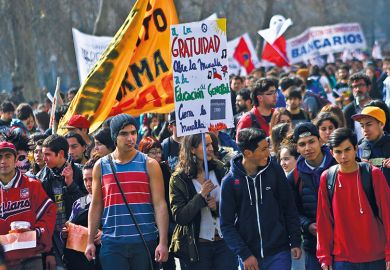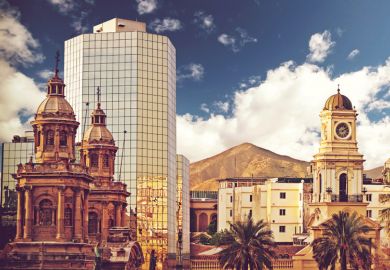Efforts to reform Chilean higher education have stalled following the comprehensive rejection of the country’s new proposed constitution.
Gabriel Boric, the former student leader turned president, said he was “humbled” by the defeat of the country’s “Magna Carta” – that would have enshrined a right to free higher education – in a plebiscite by 62 per cent to 38 per cent.
Although the country’s Congress is likely to initiate another constitutional process shortly – aimed at redrafting the document and getting it approved – key sections are likely to be dropped to address one of the major concerns that the last draft was too lengthy and tried to do too much.
Commitments to create new public universities and to increase research spending to 1 per cent of gross domestic product may not make it into the new draft, according to academics who also said that uncertainty over what happens next was paralysing the country and making educational reform by other means unlikely.
“The new proposal will need to be much smaller, less ambitious in scope. It will establish rights for people in general on education and health but I wouldn’t expect so much detail,” said Maria Veronica Santelices, associate professor of education at the Pontificia Universidad Católica de Chile.
Dr Santelices said Chile had “got to a place of no return” in terms of establishing free higher education as a right – and therefore this commitment might still feature – but the impact of the principle on student numbers, quality of education and how universities handle admissions had not been thought through and the impasse was a chance to figure out whether the commitment could be made compatible with the system currently in place.
“Private institutions have felt very threatened by a lot of the proposals,” she said. “But there may be space to fulfil these demands in a way that reconciles the public and private offering of services.”
Academics may be handed a bigger role in the constitutional redrafting, according to Carolina Guzman Valenzuela, professor of higher education at the University of Tarapacá, who said that the Boric government had squandered much of its political capital by tying its fate so closely to that of the constitution and would probably look to experts to try to give the process more independence next time.
But, while a new constitutional process was being decided, other key issues affecting higher education were going unaddressed, she added.
“Chile spends a lot of money on sending people abroad to do their PhDs and then they come back and they don’t have a job or only have a very precarious contract,” Professor Valenzuela said.
“Competition has produced a toxic environment. Young researchers struggle to develop their abilities because they have to compete all the time and there are very few jobs.”
While higher education has not so far been seen as a key priority for the government, a change of science minister in the aftermath of the vote could signal a different approach, according to Professor Valenzuela.
Silvia Díaz, a member of the more moderate Party for Democracy, has replaced Communist Party member Flavio Salazar – previously the vice-president for research and development at the University of Chile, Santiago – who Professor Valenzuela said had “lacked an agenda” and was a bit “invisible” in post.
She hoped the new minister would “promote a different narrative about science” that recognises its broader impact and is not just focused on how research can drive economic growth.
“Universities are really shaped by what the ministry says so what she does is crucial,” Professor Valenzuela said.
Register to continue
Why register?
- Registration is free and only takes a moment
- Once registered, you can read 3 articles a month
- Sign up for our newsletter
Subscribe
Or subscribe for unlimited access to:
- Unlimited access to news, views, insights & reviews
- Digital editions
- Digital access to THE’s university and college rankings analysis
Already registered or a current subscriber?








